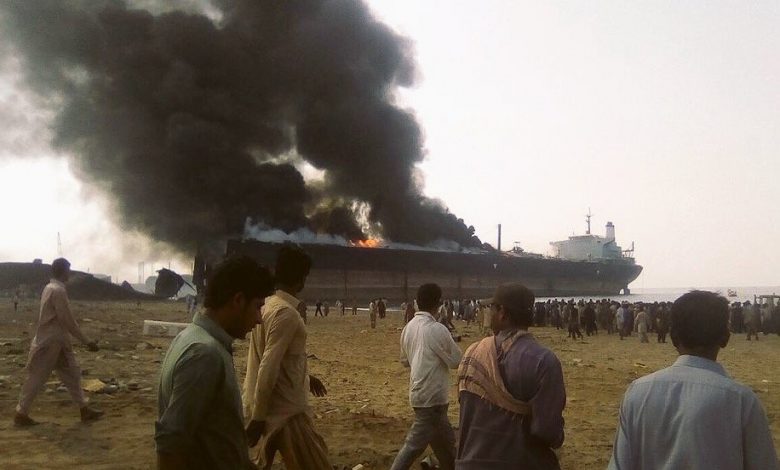
A fire, which has now killed at least 21 people, is still raging at Pakistan’s Gadani ship recycling area with fears the eventual death toll could hit triple figures. An explosion occurred on Tuesday as a welder worked on a gas cylinder in a beached oil tanker. The explosion rapidly became an inferno with many workers trapped in the ship. As well as 21 confirmed deaths, more than 70 people are in hospital with many suffering severe burns while more than 50 workers remain unaccounted for.
Nasir Mansoor, deputy-general secretary of the National Trade Union Federation (NTUF), hit out at the absence of safety procedures at Gadani yesterday, saying the Indonesian ship’s tanks had not been cleaned ahead of the scrapping starting. Moreover, Mansoor alleged the yard had just one ambulance, which was being actually used for transporting the officials’ children to and from school. Mansoor said a total of 250 workers were working on the tanker when the explosion occurred.
“We demand that a murder case be registered right away against the Ship Breakers’ Association,” he said, calling for Rs3m compensation for each of the dead victims’ families.
Angry protests have been seen in front of the yard in the past couple of days.
Gadani Police have registered a case against four people, including the owner of the yard and two contractors with one arrest to date.
Prime minister Nawaz Sharif yesterday formed a committee to investigate the shipyard blast.
Balochistan chief minister Nawab Sanaullah Zehri vowed yesterday: “Strict action would be taken against those found responsible for the incident.”
“This terrific accident is a painful reminder of the dangerous working conditions at the shipbreaking yards in Gadani. Our thoughts go first and foremost to the victims, to their families and friends,” said Ingvild Jenssen, Policy Director of the NGO Shipbreaking Platform.
The floating oil production tanker, ACES (IMO # 8021830), was sold to the Gadani shipbreaker by Jakarta-based PT Sinar Mentari Prima and was used in the Jabung Batanghari terminal owned by the Indonesian government company BPMIGAS and operated by PetroChina. The change of flag and name of the ship happened just weeks before it reached the beach of Gadani, which strongly point towards the use of a cash buyer for the sale of the end-of-life vessel.
“Health and safety must come first. This terrible blast could have been avoided. There is a clear lack of infrastructure and equipment in Gadani to prevent such a deadly accident. Rescue operations are extremely difficult due to the lack of ambulances and firefighting equipment and because rapid access to the ship and the workers that are still stuck inside is extremely challenging,” said Abid Qaiyum Suleri, Executive Director of Sustainable Development Policy Institute (SDPI), Pakistani Platform member organisation.
The NGO Shipbreaking Platform is calling for the closure of the Gadani beaching yards and for a move of the industry off the beach to areas that are under strict control, using alternative and safer methods in docks or along piers.

Funny how they are willing to investigate and bring prosecutions after this tragic and unfortunate incident however, if they had of insisted on good working practices up to now there is the possibility that the accident would not have happened. A case of bolting the stable door long after the horse has bolted?
Recommend changing “terrific” to either “horrific” or “terrible”.
What even more painful is that the vulnerable conditions at the site of the incident, SOPs NOT in place for dealing with hazardous wastes, specifically for ship-breaking and NO regulatory requirements in place were identified in 2013 study report and communicated to the policy-makers and again reminded in national stakeholders workshop in June, 2016.
A donors meeting for consideration of technical & financial assistance to meet the challenges towards improvement of conditions at the site and to implement control measures is expected to take place this month